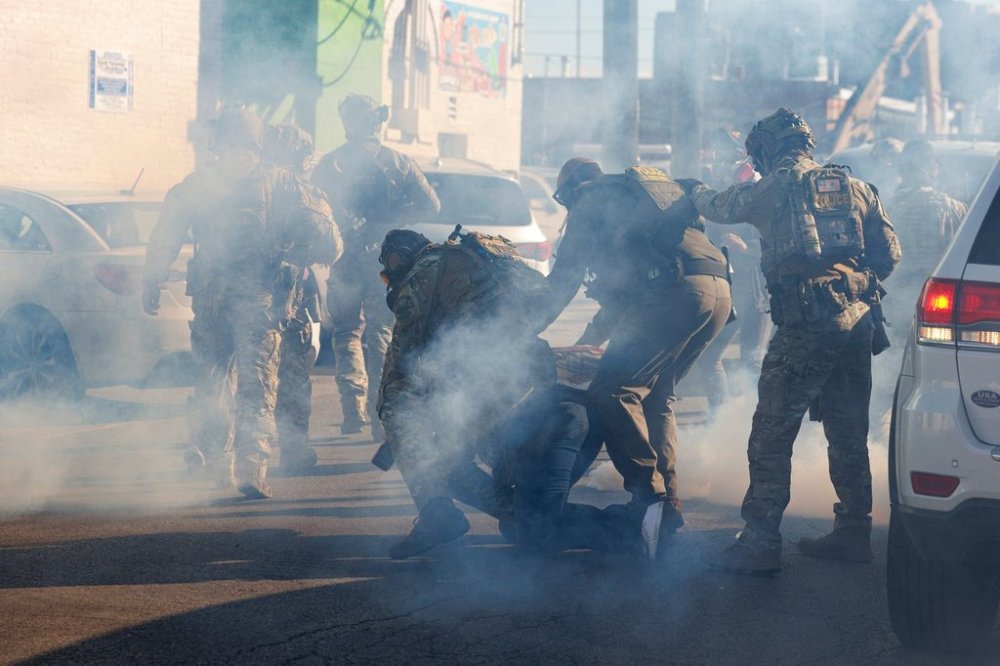Appeals court pauses order restricting use of force by immigration agents in Chicago-area crackdown
Advertisement
Read this article for free:
or
Already have an account? Log in here »
To continue reading, please subscribe:
Monthly Digital Subscription
$0 for the first 4 weeks*
- Enjoy unlimited reading on winnipegfreepress.com
- Read the E-Edition, our digital replica newspaper
- Access News Break, our award-winning app
- Play interactive puzzles
*No charge for 4 weeks then price increases to the regular rate of $19.00 plus GST every four weeks. Offer available to new and qualified returning subscribers only. Cancel any time.
Monthly Digital Subscription
$4.75/week*
- Enjoy unlimited reading on winnipegfreepress.com
- Read the E-Edition, our digital replica newspaper
- Access News Break, our award-winning app
- Play interactive puzzles
*Billed as $19 plus GST every four weeks. Cancel any time.
To continue reading, please subscribe:
Add Free Press access to your Brandon Sun subscription for only an additional
$1 for the first 4 weeks*
*Your next subscription payment will increase by $1.00 and you will be charged $16.99 plus GST for four weeks. After four weeks, your payment will increase to $23.99 plus GST every four weeks.
Read unlimited articles for free today:
or
Already have an account? Log in here »
CHICAGO (AP) — A federal appeals court on Wednesday temporarily halted an order restricting the use of force by federal immigration agents in the Chicago area, calling it “overbroad” and “too prescriptive.”
But the7th U.S. Circuit Court of Appeals also cautioned against “overreading” its stay and said a quick appeal process could lead to a “more tailored and appropriate” order.
Earlier this month, U.S. District Judge Sara Ellis issued a preliminary injunction in response to a lawsuit filed by news outlets and protesters who claimed federal officers used excessive force during an immigration crackdown that has netted more than 3,000 arrests since September across the nation’s third-largest city and its many suburbs.

Government attorneys had argued that the order restricted the enforcement of the nation’s laws and could “subvert” the constitutional structure.
In issuing a stay Wednesday, the three-judge panel said the government’s arguments were likely to prevail in court.
“The preliminary injunction entered by the district court is overbroad,” the two-page ruling said. “In no uncertain terms, the district court’s order enjoins an expansive range of defendants, including the President of the United States, the entire Departments of Homeland Security and Justice, and anyone acting in concert with them.”
It added that the order was “too prescriptive” as it specified the types of riot control weapons and other devices in a way that “resembles a federal regulation.”
Among other things, Ellis’ order restricted agents from using physical force and chemical agents like tear gas and pepper balls, unless necessary or to prevent an “an immediate threat.” She said the current practices violated the constitutional rights of journalists and protesters.
During a lengthy court hearing this month, witnesses gave emotional testimony when describing experiencing tear gas, being shot in the head with pepper balls while praying, and having guns pointed at them.
Ellis determined that Trump administration witnesses were “simply not credible,” including Gregory Bovino, a Border Patrol commander who led the Chicago area operation before moving on to to North Carolina in recent days.
Attorneys for the plaintiffs and the Department of Homeland Security did not immediately return messages seeking comment on Wednesday’s stay.
Bovino, the head of a Border Patrol sector in El Centro, California, has repeatedly defended agents’ use of force. He oversaw about 230 agents from U.S. Customs and Border Protection in the Chicago area starting in September. After North Carolina, federal border agents are expected to be deployed to New Orleans.
The immigration operation in the Chicago area has triggered multiple lawsuits, including allegations about inhumane conditions at a federal immigration center. The legal complaint prompted a federal judge and attorneys to visit the longtime U.S. Immigration and Customs Enforcement facility outside Chicago last week.

